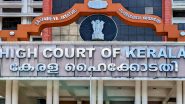New Delhi, Dec 20 (PTI) Flagging rampant wastage of water in the agriculture sector, a parliamentary panel has recommended to the government to explore the option of having "energy efficient pricing" and said it may become an important tool for sustainable management of groundwater resources.
The Parliamentary Standing Committee on Water Resources, in its report tabled in Parliament on Tuesday, pulled up the government over its response to an earlier suggestion of the panel on the issue.
Also Read | Bhagwant Mann 'Drinking and Driving' Punjab, Says Akali Dal MP Harsimrat Kaur Badal (Watch Video).
The panel said there is an urgent need to bring down the water consumption in the agriculture sector. It also said subsidized electricity and fertilizer had encouraged farmers to grow water-intensive crops even in the areas having water scarcity, and called for "institutional changes".
The report stated the committee regrets to note that the action taken reply furnished by the Department of Water Resources, River Development and Ganga Rejuvenation is silent on the specific recommendation of the committee urging it to explore the option of having energy efficient pricing, which may become an important tool for sustainable management of groundwater resources.
"Considering the fact that managing water use in agriculture is a way forward to prevent rampant wastage of water, the committee reiterates its recommendation that the department (of water resources) should pursue actively in coordination with the Ministry of Agriculture and the Ministry of Power and the concerned states the option of effective water pricing for a more sustainable use of water in agriculture sector," the panel said in its report.
The committee also asked the government to apprise it of the steps taken by the department concerned in this regard within three months.
The government in its reply to the panel's recommendations had spelled out measures being taken for conserving ground water, which includes an aquifer mapping and management programme, and management plans like crop diversification, sprinkler system, and drip irrigation.
The government also said public interaction programmes are being organised at grassroots level for disseminating the tenets of the aquifer management plans as part of the National Aquifer Mapping and Management (NAQUIM) Programme for the benefit of stakeholders, including farmers.
"So far, 1,093 such programmes have been conducted in different parts of the country including 'over-exploited' and 'critical' ground water areas in which nearly 90,000 people including farmers have been sensitized on various aspects of water conservation and ground water management," the Jal Shakti Ministry said in its reply, as quoted in the report.
The ministry also mentioned mass awareness programmes such as the Sahi Fasal campaign, Catch the Rain campaign, and the Amrit Sarovars scheme to rejuvenate 75 water bodies to mark 75 years of independence.
The panel, however, was not satisfied with the government's reply, and said, "The committee regrets to note that the action taken reply furnished by the Department of Water Resources, River Development and Ganga Rejuvenation is silent on the specific recommendation of the committee."
In an earlier report, the committee had noted that per capita water availability in the country is reducing progressively. The average annual per capita water availability in 2001 and 2011 was assessed as 1,816 cubic meters and 1,545 cubic meters respectively, which may further reduce due to increase in population.
"Annual per capita water availability of less than 1,700 cubic meters is considered as water stressed condition, whereas annual per capita water availability below 1,000 cubic meters is considered as a water scarcity condition," the committee said.
It also noted with concern that the biggest water consuming sector in the country was agriculture, followed by domestic and industrial sectors.
(This is an unedited and auto-generated story from Syndicated News feed, LatestLY Staff may not have modified or edited the content body)













 Quickly
Quickly
















